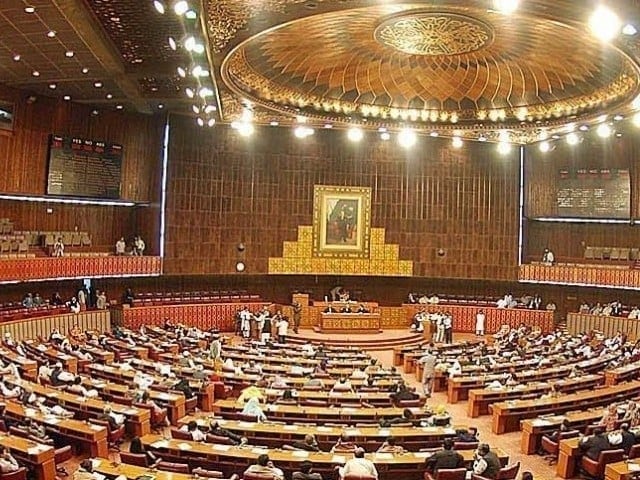ISLAMABAD – The bill concerning the increase in the number of Supreme Court judges has been deferred in the National Assembly.
The National Assembly session, chaired by Speaker Sardar Ayaz Sadiq, included the presentation of a notice by Naveed Qamar regarding the allocation of 4.8 million acres of land for corporate farming and the diversion of water flow.
Minister for Water Resources Musadik Malik responded that under the Green Corporate Initiative, 800,000 acres of barren land have been allocated for cultivation.
This is a project of the Punjab government, supported by both Punjab and Sindh provinces.
The project, worth 211 billion, includes the construction of a 296-kilometer canal. Punjab will provide its share of water, and no other province’s water will be used. Naveed Qamar commented that Pakistan, as a country, cannot afford such projects.
Musadik Malik offered to discuss the matter further if there was any confusion, stating that one million acres of land in Balochistan have been identified for cultivation, and if Sindh has any issues, they are welcome to withdraw their land.
Syed Khurshid Shah emphasized the sensitivity of the matter and suggested forming a committee to assess the water flow downstream of Kotri and calculate the water required for 4.8 million acres of land. He questioned whether the decision was between needing 4.8 million acres of land or preserving Pakistan.
Amendment Bill to increase the number of Supreme Court judges presented in Senate
JUI member Noor Alam Khan presented the Constitutional Amendment Bill 2024 in the National Assembly, which seeks to amend Article 184(3) of the Constitution concerning the Supreme Court’s suo moto powers. The Speaker referred the bill to the Standing Committee.
According to the amendment, public interest cases in the Supreme Court must be heard by a bench of at least nine judges.
The affected party can appeal the Supreme Court’s decision within 30 days.
The proposed amendment also stipulates that the appeal must be heard by a bench larger than the one that issued the original decision.
Article 184(3) grants the Supreme Court authority to rule on matters of public importance, but these decisions are currently made by benches of two or three judges, leading to the proposed changes to consider the significance of the Court’s jurisdiction.
Noor Alam Khan stated that Article 184(3) has been misused in the past, resulting in punishments for political figures through suo moto notices.
Law Minister Azam Nazeer Tarar said that adding too much detail to the Constitution can create complexities.
Noor Alam Khan also presented a Constitutional Amendment Bill proposing the allocation of reserved seats for overseas Pakistanis in the National Assembly, Senate, and Provincial Assemblies, which was also referred to the Standing Committee by the Speaker.
Noor Alam Khan introduced a Constitutional Amendment Bill that seeks to impose a ban on dual citizenship for Supreme Court and High Court judges as well as bureaucrats, which was referred to the Standing Committee.
Law Minister Azam Nazeer Tarar informed that the Establishment Division has instructed opposition to the bill, noting that there is no dual citizenship in the military or Parliament.
Noor Alam Khan further presented the Contempt of Court Repeal Bill 2024, which the Speaker referred to the Standing Committee.
The bill proposes either the repeal or amendment of the Contempt of Court Law. Opposing the bill, Barrister Gohar argued that if the judiciary does not have the right to enforce its orders, who does?
PML-N’s Daniyal Chaudhry requested to present the 2024 bill, proposing an increase in the number of Supreme Court judges from 17 to 23. However, Barrister Gohar pointed out that under Articles 74 and 81, only the government can present this bill, as it cannot be a private member bill. According to the rules, the bill requires approval from the Cabinet and the government.
The Speaker of the National Assembly stopped Daniyal Chaudhry from presenting the bill and deferred the motion to present the bill regarding the increase in the number of judges.










